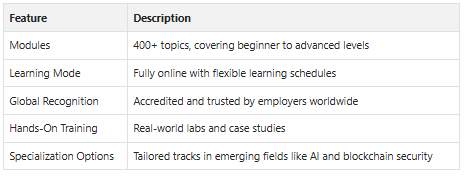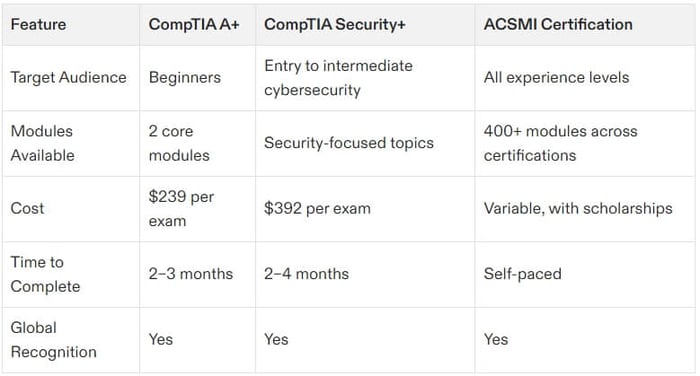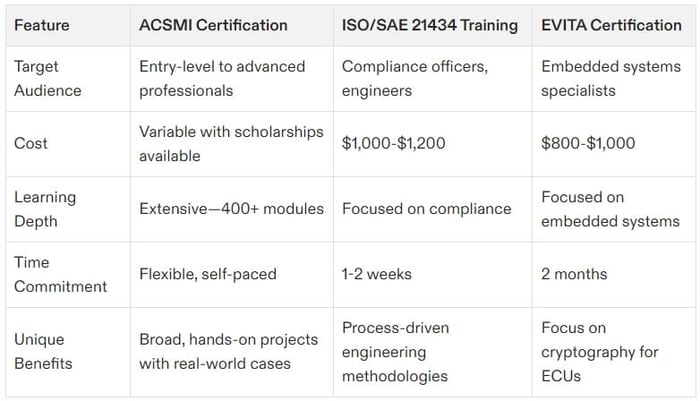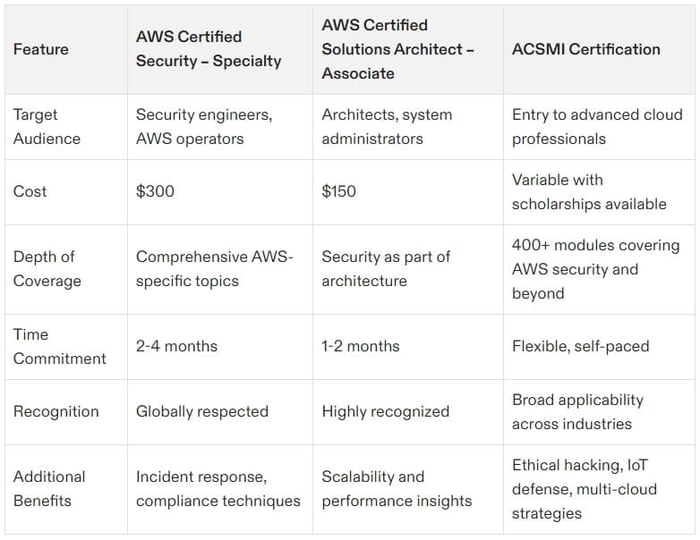Table of Contents
- The Importance of Cybersecurity Certification Polytechnique
- Why Choose a Cybersecurity Certification Polytechnique?
- Who Should Pursue a Cybersecurity Certification Polytechnique?
- How to Choose the Best Cybersecurity Certification Polytechnique
- Career Trajectory After Completing a Cybersecurity Certification Polytechnique
- Why ACSMI Stands Out for Cybersecurity Certification Polytechnique
- FAQs
- Final Thoughts
In today’s technology-driven era, where cyber threats evolve at an alarming pace, the need for qualified cybersecurity professionals has never been greater. Whether it’s safeguarding sensitive data, preventing network breaches, or mitigating risks, businesses across every industry rely heavily on experts to keep their systems secure. This is why pursuing a cybersecurity certification polytechnique has become a game-changer for aspiring professionals and industry veterans alike.
The Importance of Cybersecurity Certification Polytechnique
The growing prevalence of cyber threats has made cybersecurity one of the most critical disciplines in today’s tech-driven world. Whether it’s protecting sensitive data, securing networks, or managing risk, skilled cybersecurity professionals are in high demand across every industry.
A cybersecurity certification polytechnique provides a carefully structured learning path to develop expertise in this field. It combines theoretical knowledge with practical techniques, preparing you for real-world challenges and ensuring your skills remain relevant as technology evolves. Designed for students and professionals alike, polytechnique certifications provide an edge in today’s rapidly growing job market.
Why Choose a Cybersecurity Certification Polytechnique?
Choosing a cybersecurity certification polytechnique is an excellent option for those seeking comprehensive, advanced training. These programs are distinct in their structure, offering a multidisciplinary approach that caters to diverse career goals. Here’s why polytechnique programs are worth considering:
1. Comprehensive Curriculum
Polytechnique certifications cover a wide range of topics, from foundational cybersecurity principles to niche specializations like AI-driven risk management or IoT (Internet of Things) security. Programs from institutions like ACSMI offer more than 400 modules, making them ideal for professionals at all skill levels.
2. Focus on Practical Learning
Hands-on experience is the centerpiece of any polytechnique program. Expect to engage in simulated cyberattacks, threat mitigation exercises, and other real-world scenarios that enhance your ability to tackle complex security issues.
3. High Career Demand
A cybersecurity certification polytechnique arms you with industry-recognized skills, enabling you to stand out in competitive job markets. Certifications like those offered by ACSMI are globally recognized, making your knowledge and expertise valuable worldwide.
4. Specialization Options
Explore advanced tracks like ethical hacking, blockchain security, or cloud computing. Many programs allow you to specialize and tailor your learning to specific career aspirations.
Who Should Pursue a Cybersecurity Certification Polytechnique?
This certification isn’t just for existing tech professionals—it’s also suitable for beginners seeking a structured educational path into cybersecurity. Here are a few examples of who can benefit from enrolling in a cybersecurity certification polytechnique:
- Students: Gain a head start in a lucrative, tech-savvy career.
- IT Professionals: Expand your skill set to include cybersecurity expertise.
- Career-Changers: Transition into a high-demand field with clear growth opportunities.
- Cybersecurity Enthusiasts: Formalize your interest with recognized credentials.
How to Choose the Best Cybersecurity Certification Polytechnique
Choosing the right cybersecurity certification polytechnique can initially feel overwhelming due to the wide variety of options available. However, by focusing on a few key factors, you can identify a program that aligns perfectly with your goals and sets you up for success. Here’s a detailed guide to help you make the best decision.
1. Evaluate Your Career Goals
The first step is understanding where you want to take your cybersecurity career. Knowing your aspirations will help you narrow down certifications that match your desired job roles.
- Entry-Level Aspirations: If you’re starting fresh with no prior experience, consider beginner-friendly programs like those offered in ACSMI’s certification program. These cover the foundations of cybersecurity, including network security basics, risk assessment, and compliance.
- Advanced Career Objectives: For those aiming to climb higher, look at certifications specializing in governance, risk, or niche areas like ethical hacking or blockchain security. Advanced tracks allow you to focus your skills and stay competitive.
Knowing your ultimate goal ensures you invest in certifications that directly benefit your long-term career development.
2. Research Accreditation and Reputation
Not all polytechnique programs carry the same weight in the industry. Certifications backed by globally recognized providers hold more credibility and are more likely to open doors with employers.
- Look for programs from organizations like ACSMI, Cisco, or ISC2, as their certifications are widely respected by hiring managers.
- Check to see if the program has endorsements from cybersecurity organizations or accreditation bodies. Providers that demonstrate a clear commitment to quality standards will stand out in the competitive job market.
Accreditation and reputation are vital in ensuring your certification will hold value across industries and international markets.
3. Check for Hands-On Training Opportunities
Cybersecurity is a practical field, requiring real-world skills to deal with evolving threats. This makes hands-on training an essential component of any cybersecurity certification polytechnique program.
- Essential Components: Look for courses that include labs, case studies, or interactive simulations. These tools help you apply theory to solve real-world challenges, improving your job-readiness.
- Standout Programs: ACSMI’s certification program incorporates extensive labs and simulation exercises that mimic real-world scenarios, such as penetration testing or incident response planning.
Prioritizing practical learning ensures you’re equipped to handle the dynamic nature of cybersecurity roles.
4. Identify Flexibility and Affordability
Balancing certifications with your current commitments—be it a job, family, or education—can be challenging. That’s why flexibility and affordability need to be factored into your decision.
- Online or Self-Paced Learning: Many reputable programs, including ACSMI, offer online or hybrid formats that allow you to study on your own schedule.
- Financial Considerations: Check for payment plans, financial aid opportunities, or discounts to make learning more accessible. While high-quality programs may be an investment, they often provide long-term career value.
By selecting a program that accommodates your schedule and financial needs, you’ll be more likely to successfully complete your certification.
Choosing Smartly for Lasting Career Success
Taking the time to evaluate these critical factors will help you choose a cybersecurity certification polytechnique that aligns with your personal goals, professional aspirations, and lifestyle. A well-chosen certification will not only set you up for lucrative opportunities but also ensure that you have the confidence and skills to thrive in the rapidly evolving cybersecurity industry.
Career Trajectory After Completing a Cybersecurity Certification Polytechnique
The career opportunities unlocked by a cybersecurity certification polytechnique are vast and promising. Entry-level certifications can lead to roles like Security Analyst or Junior Cybersecurity Specialist, while advanced credentials pave the way for senior positions, such as Cybersecurity Manager or Ethical Hacker.
Potential Job Roles in Cybersecurity
- Security Analyst: Monitor threats and vulnerabilities in an organization’s network.
- Ethical Hacker: Find and fix security loopholes before malicious hackers exploit them.
- Cybersecurity Engineer: Design robust security systems to protect IT infrastructure.
- Risk Manager: Assess and mitigate risks across business operations.
- Chief Information Security Officer (CISO): Oversee all cybersecurity strategies.
Why ACSMI Stands Out for Cybersecurity Certification Polytechnique
FAQs
1. What is a cybersecurity certification polytechnique?
A cybersecurity certification polytechnique is a detailed program designed to provide multidisciplinary cybersecurity training. It’s ideal for beginners and professionals who want comprehensive insights into multiple aspects of cybersecurity.
2. How long does it take to complete this certification?
The duration varies based on the program. Beginner modules may take 8-12 weeks, while advanced, multi-level certifications can take up to a year or more.
3. Is the certification available online?
Yes, many cybersecurity certification polytechnique programs, such as those offered by ACSMI, are available online, providing flexible learning schedules.
4. Can beginners enroll in these programs?
Absolutely! Most polytechnique certifications, including ACSMI’s beginner modules, are tailored for those with no prior experience in cybersecurity.
5. Are polytechnique certifications recognized globally?
Yes, certifications from reputable providers like ACSMI, CompTIA, and Cisco have global recognition, making them highly valuable for professionals aiming for international careers.
Final Thoughts
The benefits of a cybersecurity certification polytechnique are immense, ranging from career readiness to global recognition in one of the fastest-growing fields of tech. With programs such as those offered by ACSMI, students and professionals alike can gain the skills and certifications necessary to thrive in the cybersecurity industry.
Begin your certification path today and take the first step toward a rewarding future in cybersecurity!





